Hello everyone, what’s up?
In my previous articles, I explore the article of the cycle of socialization and TED-Talk of Ibram X. Kendi.
In this article, I will examine the mechanism of internalized oppression.
こんにちは、みなさん!調子はどうですか。
前回までの記事では、社会化というサイクルやイブラム・X・ケンディのTEDトークについて取り上げました。
この記事では、抑圧の内在化について掘り下げたいと思います。
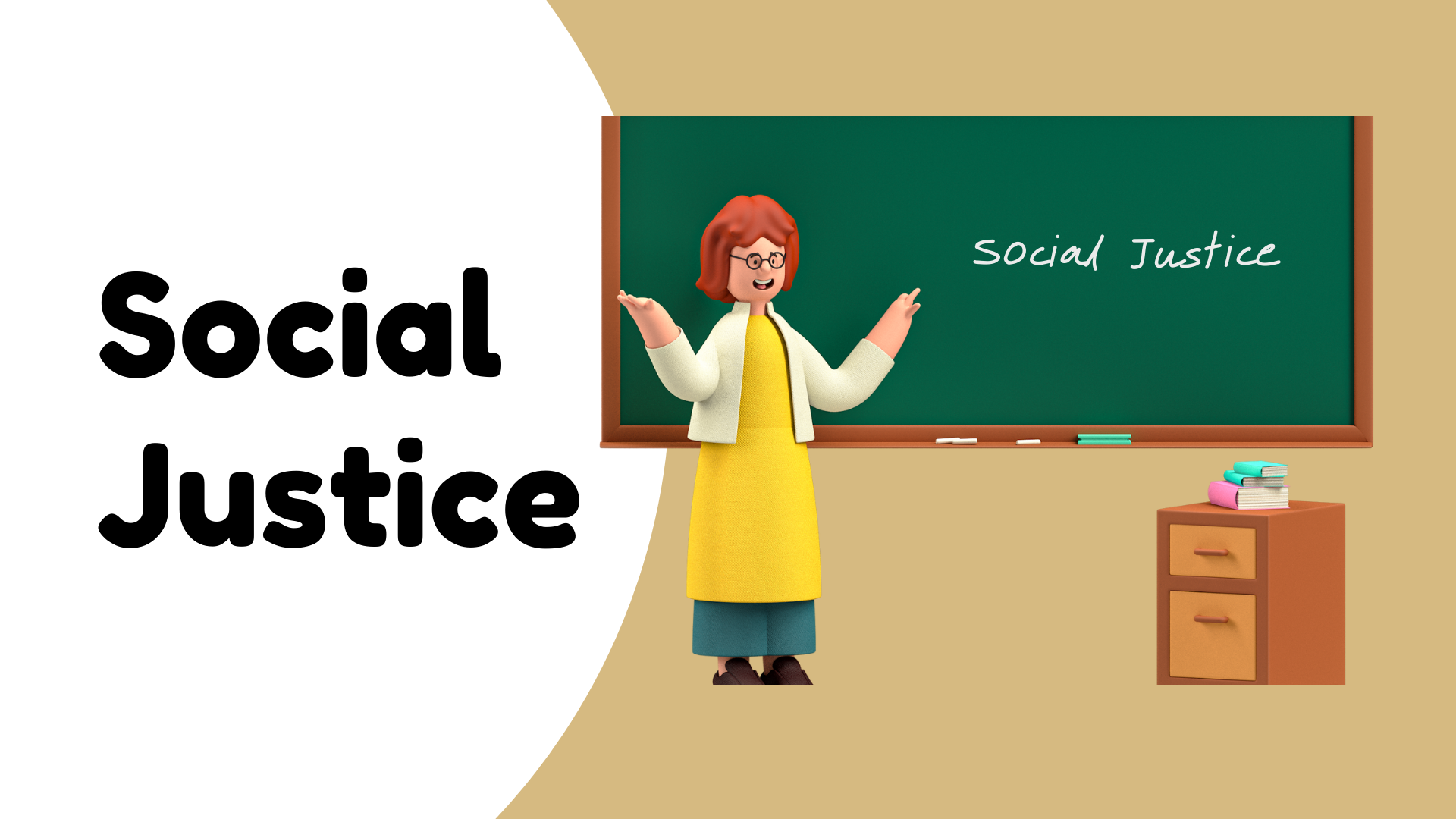
Racism#3
What is internalized oppression?◼内在化された抑圧とは
There is a social system in a society that divides people into social groups in accordance with a specific set of social identities. These social identities predispose people to hierarchal roles in the dynamic system of oppression. This oppression functions to maintain exploitation since people from each group cooperate and oppress one another.
社会には、特定の社会的アイデンティティに従って人々を社会的グループに分別する社会システムがあります。この社会的アイデンティティは、抑圧のダイナミックを作り人々を階層的な役割を与え、演じさせます。この抑圧は、各グループ内の人々が協力して、他のグループを互いに押さえつけ合い、搾取の維持に寄与します。
This process is called the cycle of socialization. People experience three levels of oppression throughout the process.
この過程は社会化のサイクルと呼ばれます。人は、この過程を通して3つのレベルの抑圧を経験します。
When a subordinate group of people has been repeatedly mistreated, the patterns begin to act out on members of a dominant group perpetrated by members of the group.
Like any other pattern, you don’t need the perpetrator telling you that you are no good, you hear it in your head. You believe the stereotypes and lies about people in your group. This is called internalized oppression.
ある従属グループの人々が繰り返しひどい扱いを受ける時、そのパターンは支配グループのメンバーによる行動から始まります。
しかし、他のパターンと同様「あなたは悪い」とあなたに言う加害者を常に必要としません。それがいつものことになると、その声は、あなたの頭の中から聞こえてくるようになります。あなたはその固定観念を信じるようになり、自分のグループの人々について嘘をつくようになります。これを内面化された抑圧と呼びます。
A study of institutional opression◼
We have kids in the inner cities who are verbal geniuses, but we call them deficient in school and attempt to eradicate a part of their identity.
Geneva Smitherman, in Dinwiddie-Boyd (1996)
街の中には言葉の天才である子供たちがいますが、私たちは学校で彼らを不良品だと呼び、彼らのアイデンティティの一部を根絶しようと画策しているのです。
“Dismantling anti-black linguistic racism in English language arts classrooms” is an article written by April Baker-Bell, a scholar at Michigan State University.
The article contextualizes the contemporary linguistic inequalities that Black students experience in school in Detroit and depicts the perceptions of Black Language reflected internalized anti-black linguistic racism.
「英語の芸術教室における反黒人の言語的人種差別の解体」は、ミシガン州立大学の学者であるエイプリルベイカーベルによって書かれた記事です。
この記事は、デトロイトの黒人生徒が学校で経験する現代の言語的不平等を文脈化し、黒人言語の認識が内面化された反黒人種差別を反映していることを描写しています。
Background
The concept of academic language was developed in the mid-1970s. It was for making a distinction between language that is used in school and language that is used outside of school. However, this attempt has created a social hierarchy, and “academic language” serves as a proxy for White Mainstream English.
学術言語という概念は1970年代半ばに生まれました。学校で使われている言語と学校外で使われている言語を区別するためでした。しかし、この試みは社会的階層を生み出し、「学術言語」は白人主流英語の代用語として機能しています。
Anti-black linguistic racism refers to…
- linguistic violence
- persecution
- dehumanization
- marginalization
アンチ黒人言語差別とは...
- 言葉の暴力
- 迫害
- 人間性の喪失
- 疎外
Discussion in a ninth grade class
All of the students in the class identified as Black or African American and communicated in the Black language.
First, they were shown Language A below.
すべての参加生徒は黒人またはアフリカ系アメリカ人で、黒人英語を話します。
まず、下の言語Aを見せます。
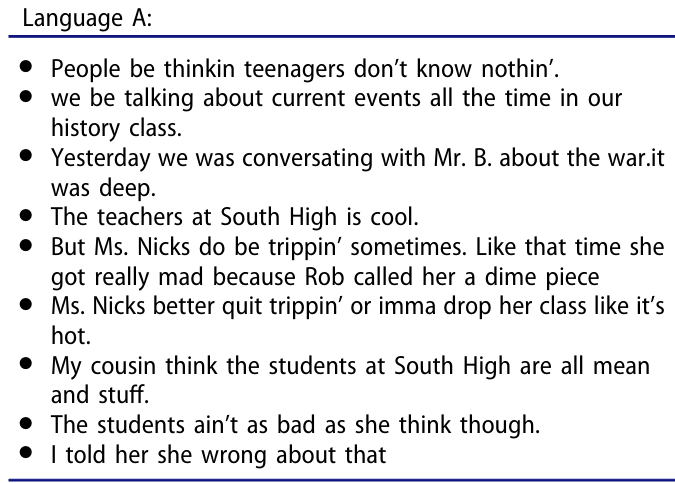
Next, they were shown Language B below.
次に、言語Bを見せます。
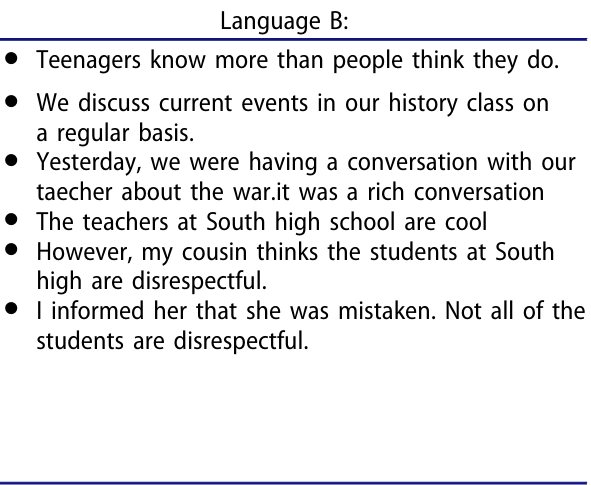
Then, let students discuss them.
This is a snapshot of the group dialog. The author points out that students reinscribed a linguistic and racial hierarchy by drawings, comments, and perspectives.
そして、参加生徒について、2つの言語について議論をしてもらいます。
下のスナップショットはグループディスカッション時のものです。著者は、イラストや、コメント、彼らの視点によって、生徒たちが言語的、そして人種的な階層システムを再記述していると指摘しています。
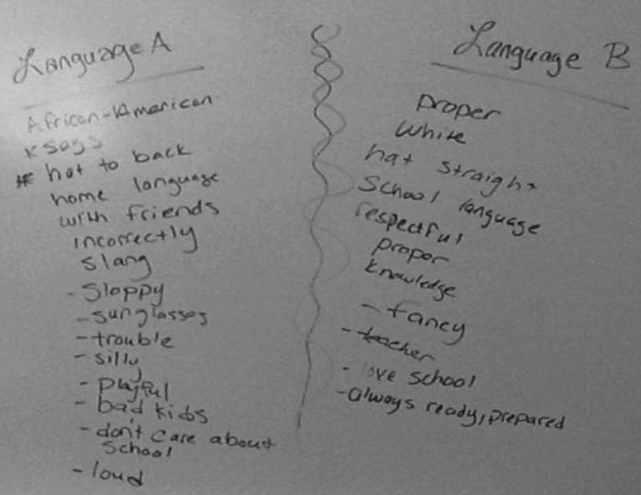
Black Language and blackness are inferior and White Mainstream English and whiteness are superior. Thus, students reinforce whiteness and anti-blackness.
黒人英語やBlackであることは劣っているということであり、白人主流英語やWhiteであることは優れているということである。ゆえに、生徒たちはWhiteであることやBlackではないことが良いことだという考え方を強めていきます。
Students conflated words and images such as “disrespectful,” “thug,” “ghetto,” “bad,” “trouble,” “skip school,” and “get bad grades” with Black linguistic and cultural norms.
This is the reflection of how students reinforce antiblackness and anti-black linguistic racism, which is called internalized oppression. Thus, institutional oppression encourages people to see things through the dominant group’s lens unconsciously and sometimes consciously, the lends of white supremacy in this case.
生徒たちは、「無礼」、「凶悪犯」、「ゲットー」、「悪い」、「トラブル」、「学校をさぼる」、「成績が悪い」などの言葉や画像を、黒人の言語的および文化的規範と混同しました。
これは、生徒がどのように黒人であることに対する反発や黒人言語差別に屈服していることの反映だと言えます。これが抑圧の内在化です。このように、機構的な抑圧は意識的であれ時に無意識的であれ、人々に支配グループの視点でものごとを見るよう働きかけます。今回のケースでは白人至上主義のレンズで物事をみる考え方を強化されていきます。
Toward an Anti-Racist Black Language
The students’ responses beg for a language pedagogy that works to dismantle anti-black linguistic racism.
生徒の反応は、黒人への言語的人種差別を解体するの言語教授が必要であることを示しています。
Azumi’s view◼アズミの見方
How does this study address racism?
This study addresses racism to eradicate institutional oppression via language in school. When people affirm a hierarchy of language, it would possibly make people not only be oppressed but also become oppressor. If a black student internalized this oppression and accept this hierarchy, then, they might become looking down people who are not fluent in White Mainstream English, such as foreigners. And the hierarchy become just deeper.
この記事は批判的人種理論にどのように関係しますか?
この研究は、学校での言語を介して制度的抑圧を根絶するための人種差別に取り組んでいます。人々が言語のヒエラルキーを肯定するとき、それはおそらく人々を抑圧されるだけでなく抑圧者になるでしょう。黒人学生がこの抑圧を内面化し、このヒエラルキーを受け入れると、外国人など、白人の主流英語に堪能でない人々を見下すようになる可能性があります。そして、階層はさらに深くなります。
How does this relate to your life?
This article has made me realized that a language can be easily an oppressing factor. In my country, Japan, people try to avoid using their dialect when they speak with a stranger. Similaly, it is often said that Japanese people tend to expect others to speak perfect Japanese language. It is one of the difficulies that a foreigner experiences in the nation. It gives me an clear view that this descrimination has to be addressed to eradicate.
この記事は批判的人種理論にどのように関係しますか?
この記事は、言語が簡単に抑圧的な要因になる可能性があることに気づきました。私の国、日本では、見知らぬ人と話すときに方言を使わないようにしています。同様に、日本人は他の人が完璧な日本語を話すことを期待する傾向があるとよく言われます。それは外国人が国内で経験する困難の一つです。それは私にこの差別を根絶するために取り組まなければならないという明確な見解を与えます。
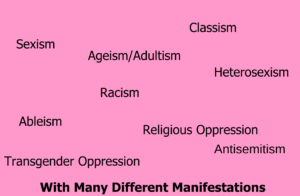
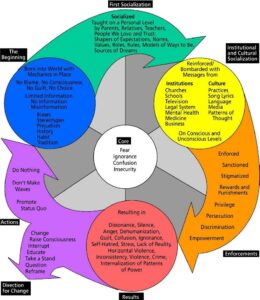
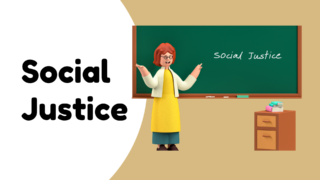
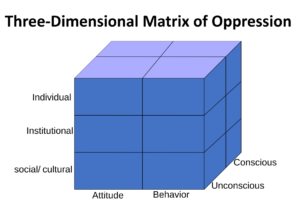


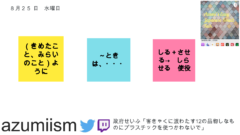
コメント